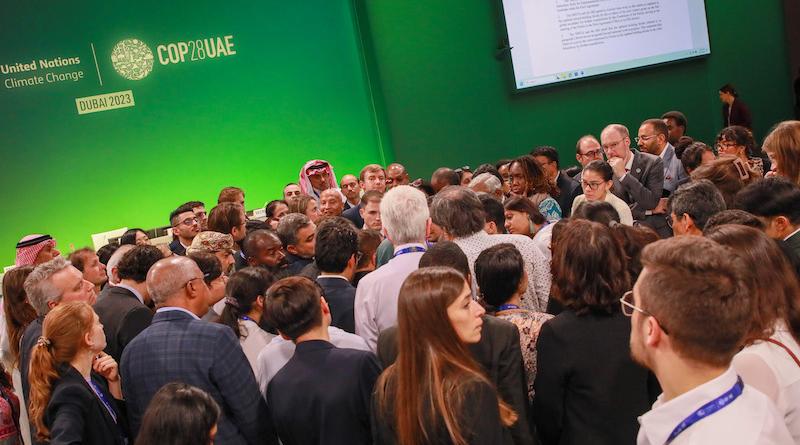Countries go ahead with carbon deals despite Cop28 standoff

Carbon credit certifiers from the much-criticized voluntary market could be the big winners of a failure to strike a deal on the exchange of offsets between countries at Cop28, experts told Climate Home.
Talks over Article 6.2 of the Paris Agreement – allowing for bilateral deals – collapsed in Dubai following a bitter fight over integrity between the European Union and the United States.
But willing countries can still move ahead with agreements in a vacuum that is increasingly being filled by independent certifiers from the voluntary market. Some observers are raising questions on whether they are fit for purpose.
Transatlantic fight
When the EU led a push at Cop28 for tighter controls over the bilateral exchange of carbon credits, one of its main goals was to restrict the role of operators from the voluntary carbon market.
In the year leading up to the summit, criticism of the market, which sells offsets mainly to corporate emitters, intensified. The climate credentials and the social and environmental integrity of several of its projects were being questioned. The nascent mechanism should draw a blank slate – the EU argued – and rely on a new standard directly supervised by the UN.
US Climate envoy John Kerry is a major proponent of carbon markets. Photo: COP28 / Christophe Viseux
The US went into the talks with a polar opposite vision. It wanted a light-touch approach built on the existing voluntary standards, accepting their requirements and using their infrastructure, according to a leaked EU memo prepared before Cop28 and first reported by The Lever.
The two forces clashed during deeply divisive marathon negotiations in Dubai, failing to find common ground. “Views have become more polarised,” said Pedro Martins Barata, an expert at EDF and a former carbon markets negotiator. “There’s more dissent on an almost philosophical level on what carbon markets should be like.”
After no deal
As the summit drew to a close, the Cop presidency put a ‘take it or leave it’ text on the table. It contained provisions the EU and other groups found unacceptable and was roundly rejected. Negotiators will try again to land a deal at Cop29 next year.
In the meantime, countries can still go ahead with bilateral deals under an initial rulebook agreed two years ago in Glasgow. “Nothing that happened in Dubai prevents countries from moving forward and some will certainly do so,” said Martins Barata.
Switzerland is developing projects with Ghana, Thailand and Vanuatu that will help achieve its climate goals. Singapore inked a similar deal with Papua New Guinea during the summit.
How Russia won a ‘dangerous loophole’ for fossil gas at Cop28
The political stalemate has opened up a big opportunity for players from the voluntary market. They are expected to take a leading role in filling the regulatory gap, experts told Climate Home.
“If a voluntary standard or its projects are given preference by certain countries, it will be a significant stamp of approval and could generate lots of investment,” said Jonathan Crook from Carbon Market Watch.
Voluntary market eyes opportunity
Some are wasting no time. Singapore, a pioneer in bilateral offsets, is partnering up with Verra and Gold Standard, the leading carbon credit registers. Their goal is to create a “playbook” with rules and procedures for countries to use existing carbon credit programs to achieve their climate plans under Article 6.
Hugh Salway, a senior director at Gold Standard, sees an important role for existing operators to speed up the implementation of deals. “A government can create its standard which would take time to develop and would be complicated to maintain,” he told Climate Home. “Or it can use our standard which is already set up with rules, methodologies, and auditors.”
Another register, the Qatar-based Global Carbon Council (GCC), is also working with a series of credits-producing countries, including Oman and Ghana. They are looking to sell article 6.2 offsets in a first-of-its-kind auction at the beginning of 2024.
“We have been doing this for years, we have the necessary capacity to make it work,” said Kishor Rajhansa, chief operating officer of GCC. Limiting the role of the private sector “would kill off the potential of article 6.2,” he added in an interview at Cop28.
Integrity concerns raised
But some observers are concerned by an outsized influence of existing standards given their chequered record.
Some flagship projects certified by Verra have come under fire for making exaggerated climate claims and for causing alleged environmental and human rights violations. The GCC has been accused of breathing new life into offsets that hardly make any difference to global emissions and would not be accepted anywhere else.
Using voluntary market systems “may simplify things, but it raises many questions about how suitable it is, both for countries and the climate, given all the issues that have been flagged,” said Carbon Market Watch’s Crook.





